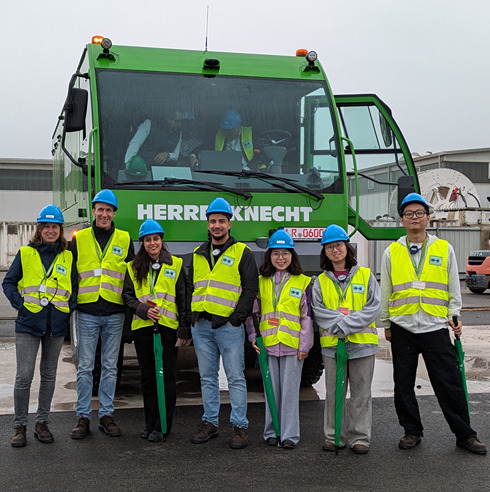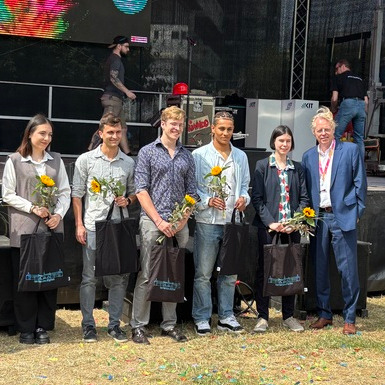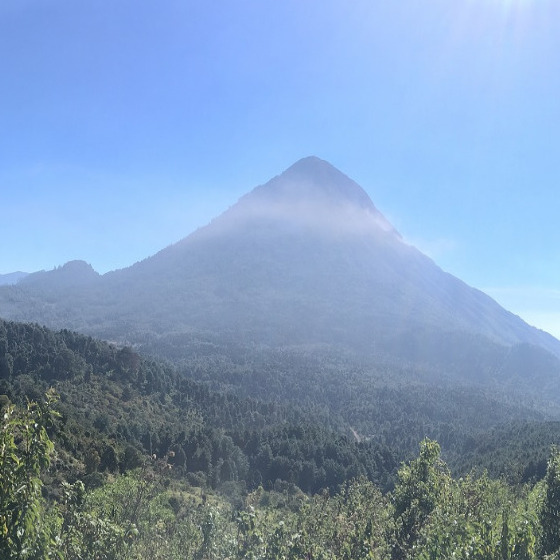
The study programs of the Faculty of Physics - Physics, Geophysics and Meteorology and Climate Physics - at the Karlsruhe Institute of Technology (KIT) can look back on a successful Study Information Day 2025. Numerous interested students took the opportunity on November 19, 2025 to find out about the exciting content and diverse career prospects.
In lectures, laboratory tours and personal discussions at exhibits and the faculty's information stand, the pupils were given a comprehensive insight into research and teaching in the field of physics. The event also offered the opportunity to talk directly to students and lecturers and to clarify questions about studying.
We would like to thank everyone involved for their great commitment and all the pupils for their interest. The Geophysics course is looking forward to continuing to inspire curious minds for the fascinating world of "Physics of the Earth" in the future!

After a year and a half of development, the Applied Geophysics working group at KIT took part in the public presentation for Herrenknecht AG's UrbanVibroTruck (UVT) on September 23 in Schwanau. The joint project is developing a Vibroseis truck for use in urban environments. In addition to an impressive live demonstration and an exclusive factory tour, participants were able to test-drive the UVT themselves on the test site – an exciting insight into modern geophysical technology and an unforgettable experience.

Our colleague Dr. Thomas Hertweck (pictured right) received the Faculty Award for Outstanding Teaching in 2025, presented by the Faculty of Physics. Dr. Thomas Hertweck regularly receives top marks from students for his dedicated and very good teaching.
We warmly congratulate him on this special award, which expresses our gratitude for his continuous investment in good teaching formats and support for our students.

We use satellite-based radar interferometry to measure the elevation of the earth's surface near the source of the earthquake in Afghanistan at the end of August with high precision.

This article presents the research field of seismo geodesy, which uses navigation satellites and imaging radar satellites to investigate fracture processes in the subsurface, among other things. This research is relevant for the better assessment of earthquake hazards, for example at the tectonically highly active edges of the Anatolian Plate.
Link_more
We are delighted that our Master's student Runa Ostermeier (2nd from right) has been awarded the University Prize of the City of Karlsruhe 2025 for her outstanding achievements in her geophysics studies.
She is a laureate of our renowned Faculty of Physics and we congratulate her on this well-deserved recognition.

On KIT`s Open Day and Campus-Day, the Geophysical Institute (GPI) welcomed many young and curious visitors with two popular hands-on experiments, offering an accessible introduction to geophysics.
With powerful and loud hammer strikes our guests generates seismic waves and were able to follow their propagation through the campus subsurface in real time.
At a second station, hidden objects were detected and visualized using smartphones by observing changes in the Earth`s magnetic field.
We sincerely thank all visitors for their great interest, enthusiasm, and for making it a wonderful day!

Researchers have discovered an unusually thick transition zone in the Earth`s mantle beneath the Caribbean - a result of ancient geotectonic processes.
Learn more

KIT geophysicists detect magma chamber beneath the West Eifel region - Campus Report from March 18, 2025
Learn more
On 8.6.24, a sunny Saturday, KIT opened its campus to prospective students and their parents as part of the annual "Campus Day". At the KIT Department of Physics, a team of professors, research assistants and students were on hand to answer questions and present the various degree programs in physics, geophysics, meteorology and climate physics.
Link zum Artikel
In September 2023, seismometers all around the globe detected a unique seismic signal that was measurable for up to nine days in some places. It was causedby a massive rockslide in the Dickson Fjord in Greenland. What triggered this signal, and why did it last that long? Researchers at the Geophysical Institute and the Black Forest Observatory investigated the phenomenon together with other scientists in an international collaboration. They discovered the source of the vibrations: the continuous sloshing of water back and forth in the narrow fjord. The researchers also pointed out that the rockslide was linked to the thinning of a glacier – a phenomenon they traced back to climate change. They have published their findings in the journal Science.
DOI: 10.1126/science.adm9247
Press release:
https://www.kit.edu/kit/english/pi_2024_070_how-a-fjord-in-greenland-generated-a-global-seismic-signal.php
10-minutes film telling the story of this research adventure:
https://youtu.be/60T9TKuuujs

When one earth plate slides under another, strong earthquakes often occur. The severe earthquake off Taiwan in early April 2024 also occurred in such a subduction zone. A recent study by researchers at the Karlsruhe Institute of Technology (KIT) and partners suggests that earthquakes of this kind are not a single rupture, but a series of ruptures in a fault network.
Learn more
In the SWR1 program Leute, Andreas Schäfer reports on flooding and its dangers. Together with a mayor, local and regional aspects are discussed. Andreas also talks about the dangers of earthquakes and climate change in our region.
Link SWR1 Erdbeben- und Klima-Gefahren in unserer Region
In SWR Science Talk, current scientific topics are presented in a discussion. As the program is also produced for radio, no pictures are used. Joachim Ritter reports on volcanism in the Eifel and earthquakes in Germany.
Link_more
The Seismology Blog of the European Geosciences Union reports on the fieldwork in Equador which was done by GPI and partners. The blog includes an interview with Benedict Braszus and nice photos.
link to the blog
On June 23 and 24, the events "Auf ein/en Bier/Kaffee mit der Erde" took place in Balingen on the Swabian Alb. Laura Gassner from the GPI was involved with a contribution on the topic of "Earthquake research and wind energy". The project is part of the "Science Year 2022 ? In demand!" and aims to promote science communication in rural areas.
Artikel im Schwarzwälder BotenOn Sunday, April 10, 2022, the SWR2 Matinee dealt with the topic of volcanism. Here, Joachim Ritter explained basic knowledge about magmatism and volcanoes as well as the ongoing work in the Eifel.
SWR-interviewOn Thursday, 31 March 2022, 9th grade high school students from the Helmholtz-Gymnasium in Karlsruhe conducted several experiments in Seismology and Physical Volcanology in the Geophysics school laboratory. Thus, they gained insights into geophysical measurement technology, data registration, its evaluation and interpretation, and were able to see how scientists work. The experiments were supervised by geophysics students from the Bachelor's and Master's programs.
Offers for studentsThe German Geophysical Society (DGG) has launched a photo contest as part of its 100th anniversary celebration. A photo showing students of KIT during an in-situ lecture at the Italian volcano Vulcano, taking temperature measurements on fumaroles received the highest number of votes in the category 'Study and Geophysics' and was awarded a prize.
100 years DGGJoachim Ritter explains the background to the volcanic eruption on Tonga in SWR-Wissen.
Joachim Ritter comments on the massive volcanic explosion near Tonga on January 15, 2022 in the ARD Tagesschau.
ARD InterviewOn Wednesday, February 02, 2022, Dr. Ellen Gottschämmer will give a talk on the topic "Forscherin am Vulkan - Geophysik in Guatemala (in German)". The talk is intended for high school students who want to learn about the career profile of female scientists. The event is organized by the "Fortbildungszentrum für Technik und Umwelt" at Campus North and held in cooperation with the network "Female Scientists at KIT".
Further information
Four students of the Geophysics Bachelor's program explain why you should study Geophysics at KIT. Check out our new Promo Video!
Bachelor's program in GeophysicsSWR interview with Joachim Ritter on the interaction of lava with seawater at La Palma in the Canary Islands.
SWR InterviewSWR Interview with Joachim Ritter about the volcano activity in the Eifel.
SWR InterviewSWR2 Wissen on 24th September: Jochen Steiner (SWR-Redaktion Wissen) in discussion with Ellen Gottschämmer.
SWR2 InterviewThe news broadcast "SWR3 Topthema" of the 20st September 2021 covered the volcano eruption on La Palma in the Canary Islands. Ellen Gottschämmer gave an interview on this topic.
SWR3 InterviewIn the VoiLA- Volatiles in the Lesser Antilles project, GPI geophysicists analysed data from seafloor seismometers to create a tomographic image of the Earth's upper mantle down to a depth of about 700 kilometres. In combination with a reconstruction of the global tectonic plate movements of the last 120 million years, evaluated together with partners at Imperial College London, they were able to interpret this image: "The tomography shows subsided tectonic plates beneath today's Caribbean Ocean," says Benedikt Braszus, master student of geophysics at KIT and first author of the study.
They have now published their results in the journal Nature Communications.
Further information (in German)Walter Zürn receives the Paul Melchior Medal during the 19th International Symposium on Geodynamics and Earth Tides which is held in the week of June 22nd 2021 in Wuhan (China) and online (due to the Covid-19 pandemic).
We congratulate Walter Zürn warmly to this well-deserved award.
Further information
The Deutsche Geophysikalische Gesellschaft introduces itself in a new video. It is aimed at people and institutions who are interested in Geophysics. The DGG has set itself the task of disseminating and increasing geophysical knowledge in research and teaching. Get an insight and watch the video.
Trailer of the DGGFilm report in 3sat/nano about interdisciplinary earthquake research in the Upper Rhine Graben.
Film reportAn international research team has conducted geological and seismological experiments on the volcanic island group of the Lesser Antilles in the Caribbean to better understand the relationship between earthquake/volcanism and water in the interior of the Earth. Their results can be read in an article in the scientific journal Nature.
Original publication NatureThe corona crisis and the associated restrictions on public life lead to less ground turbulence. The constant ground disturbance is mainly caused by ocean waves, wind, traffic and industry. Sarah Mader and Joachim Ritter found out that the reduction in traffic and industry reduces the ground disturbance at earthquake measuring stations.
Article by SWR Wissen
The Karlsruhe Institute of Technology (KIT) offers a two year Master's program in Geophysics. It is given in English and includes topics on Earthquake and Exploration Seismology as well as Natural Hazards. Teaching takes place in small groups and In Situ Lectures are taught right on site at geophysically fascinating locations. To enter the Master's program you need a solid background in mathematics and physics.
We are now taking applications for summer semester 2020.
International Master Program in Geophysics